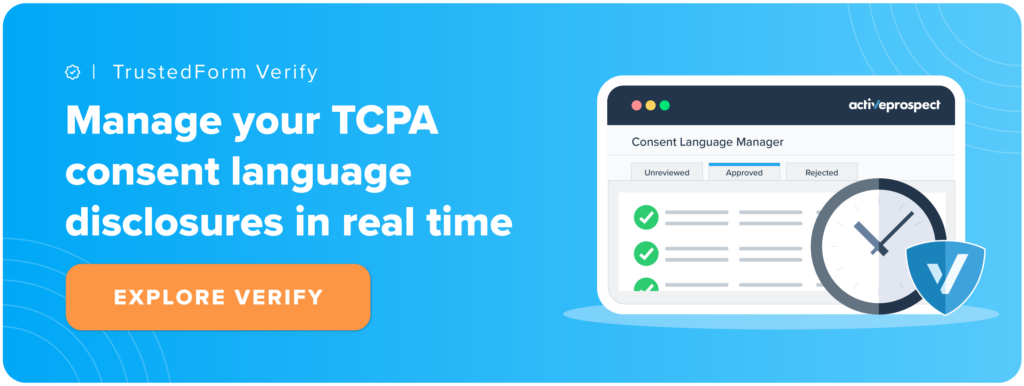FCC lead generation ruling: A guide for lead buyers and publishers

If you’re a part of the bubbling, high-stakes marketplace for leads, the recent turn of events at the Federal Communications Commission (FCC) should be firmly on your radar. The FCC’s amendments to the Telephone Consumer Protection Act (TCPA) have dramatically reshaped the lead generation space, permanently altering the strategies of lead buyers, lead sellers, and publishers in the digital space.
In the digital age, where every lead counts and distribution frameworks are the new battlegrounds, it’s imperative for industry professionals to have a solid grasp of the latest compliance regulations. This comprehensive guide details the recent FCC updates, their implications, and, most importantly, the actionable steps for addressing compliance while continuing to generate high-quality and effective leads.
By the time you’re finished with this guide, you’ll not only understand the FCC’s ruling and its implications, but you’ll also be well-equipped to steer your lead generation practices toward a compliant and prosperous future with the help of TrustedForm.
FCC ruling on lead generation
Over the last few months, the FCC’s lead generation ruling commanded a tectonic shift in lead generation strategies. In order to properly install comprehensive compliant marketing and sales strategies, lead buyers and publishers must immediately begin to recalibrate their methods to align with the amended rules that take effect in January 2025. So what does this entail?
Understanding the FCC lead generation ruling for lead buyers
With the new ruling by the FCC, buying leads will require more rigorous compliance procedures. Lead sellers and lead buyers will now need to present more transparent one-to-one consent to contact the consumer on the publisher’s lead source website webform and each will have record-keeping requirements of the consent transaction for their compliance documentation. Furthermore, the presentation of the one-to-one consent must be logical and topical in the aspects of website interaction, purpose, and content.
Understanding the FCC lead generation ruling for lead publishers
Lead publishers, especially comparison shopping sites and registration path sites, can no longer use or link to large lists of potential partners who may purchase or receive consumer personal data contact data for outreach. Publishers will have to adopt models that provide consumers a choice over who receives personal data for contact purposes. The FCC intends for this update to foster a climate of accountability and consumer trust encouraging more transparent and direct lead-generation practices.
FCC’s new rule on selling leads
Here are the main requirements of the FCC’s new rule on selling leads:
1. One-to-one consent: Marketers must obtain explicit, individual consent from consumers for each specific seller. This means a single consent can no longer apply to multiple telemarketers or marketing partners. The consent must be “in writing,” signed by the consumer, and clearly authorize the identified seller to send robocalls or robotexts using an automatic dialing system or a prerecorded voice.
2. Clear and conspicuous disclosure: Disclosures must be apparent to a reasonable consumer. This includes informing consumers that they will receive robotexts or robocalls from the seller and ensuring the communications are logically and topically related to the initial interaction that prompted the consent.
3. Restriction on sharing information: The practice of sharing consumer information with multiple marketing partners is prohibited. Consumers must consent to communications from each seller individually, rather than a general consent covering multiple entities.
4. Do-Not-Call (DNC) and text message regulations: The new rules codify that text messages are subject to the same regulations as calls under the National Do-Not-Call (DNC) Registry. Marketers need prior express invitation or permission to send text messages to numbers on the DNC list. Additionally, mobile carriers are now required to block texts from certain flagged numbers to reduce spam and fraud.
The FCC’s new rules on selling leads significantly impact how lead generation and marketing communications are conducted. Businesses need to revise their consent collection methods, ensure clarity in disclosures, and validate that each lead has given specific, informed consent.
How the FCC lead generator loophole closed
On December 13, 2023, it was announced that the lead generator loophole, which previously allowed for the wider sharing and selling of leads across networks, was going to be effectively closed by the FCC in the near future following a round of sweeping updates to the TCPA. The FCC’s proactive measures aim to eradicate ambiguities that undermine consumer privacy and erode consumer trust in text and telephone communications.
The FCC’s ruling:
- Extends Federal “do not call” (DNC) list protections to text messages.
- Redefines prior express written consent to mean an agreement that “authorizes no more than one identified seller” (lead buyer) to contact a consumer.
- Requires that calls must be “logically and topically associated with the website interaction that prompted the consent.”
- Brands (lead buyers) must also maintain documentation of consent to call and cannot rely on documentation held by the lead sellers.
The elimination of the FCC loophole mandates a structured, consent-focused strategy that ensures the consumer’s willingness is not only observed but also documented and readily available for reference.
With the recent lead generation rulings by the FCC, buying leads is struck at the core and everyone in the lead ecosystem is affected. With these stringent consent requirements set to take effect in 2025, the entire industry is being forced to look in the mirror and adapt to the new regulatory landscape.
FCC lead generation compliance tips
The latest FCC ruling carries significant consequences for both lead buyers and publishers. Failure to adapt to the new guidelines may result in volumes of litigation, severe financial impacts, and reputational damage. To address compliance, lead buyers and publishers must take proactive steps.
For lead buyers
1: Always obtain verifiable and documented 1:1 consent
This is the single most important step in the process because of the value and security it brings. In a recent webinar with ActiveProspect, Alexandra Krasovec, Partner at Manatt, Phelps & Phillips, LLP, echoed this sentiment, “If you are making marketing outreach, again, get that heightened prior express written consent. It is the laundry list of things that you have to have, but if you obtain it, that is as good as gold.”
2: Only work with compliant lead-generation content publishers and sources
In addition to implementing internal best practices to address transparency and compliance, lead buyers should also evaluate and monitor their publisher’s compliance with the new FCC TCPA rules. This step should help establish, foster, and maintain a sustainable partnership built on mutual compliance adherence.
3: Focus on lead quality
Although lead volume will inevitably decrease, lead quality should go up with only interested consumers being contacted. In a recent webinar, Gary Kibel, Partner, at Davis+Gilbert LLP, sat down with ActiveProspect and discussed how these updates could help increase lead quality and ROI. “Sometimes people are just too focused on volume and not quality,” Kibel explained. So I think you want to look at that when you’re collecting data and you’re processing it–you really want consumers that want to engage with you.”
“Don’t just focus on bringing in a huge number of leads and data points… Sometimes less data can yield a better ROI.”
TrustedForm Insights provides in-depth data on every lead generation event in real time, empowering you to make informed, data-driven decisions to optimize your lead-buying strategies and maximize ROI.
For lead publishers
1: Understand your options
This is not a time to panic, but a time to prepare. When the latest TCPA updates take effect, comparison sites will no longer be able to distribute leads to whomever they want. They will have to adopt new distribution models that give consumers a choice over who gets their data.
The FCC shared its position in their December comments:
“Websites, including comparison shopping websites, can use a variety of means for collecting one-to-one consent for multiple sellers to comply with our rule. For instance, the website may offer a consumer a checkbox list that allows the consumer to specifically choose each individual seller that they wish to hear from.”
“Alternatively, the comparison shopping website may offer the consumer a clickthrough link to a specific business so that the business itself may gather express written consent from the consumer directly.”
At ActiveProspect, we believe our proposed Ping Pick Post model provides a solution that can address the FCC one-to-one consent rules for Lead Gen Comparison site service models.
2: Reinforce consent processes
Lead publishers have a shared responsibility to present, capture, and document consumer consent to contact transactions in various lead generation models. They are required to validate the origin and authorization under the new FCC guidelines. To address compliance, lead seller publishers must refine their consent-gathering design and pathway to be transparent, easy to understand, and documented every step of the way.
Trust, TrustedForm
Navigating the amended regulatory landscape might seem daunting, but there are already innovative solutions in place to ease the transition and ensure future compliance.
At ActiveProspect, we offer robust solutions tailored to meet the evolving needs of lead buyers, lead sellers, and publishers. We have been at the forefront of consent-based marketing for two decades and help thousands of businesses certify billions of leads annually with our flagship compliance solution TrustedForm.
TrustedForm offers the highest standard for independent proof of consent through its four main products: Certify, Retain, Insights, and Verify, with solutions available to lead buyers and publishers.
Lead buyers can use TrustedForm to:
- Store certificates from your sellers with a visual representation of the consumer experience.
- Analyze or filter leads in real time.
- Leverage third-party data services that identify TCPA litigators, fraud, and more.
Lead publishers can use TrustedForm to:
- Provide documentation of each lead event.
- Automatically store certificates for the leads you generate on your lead source websites.
During these times of uncertainty, trust the company that has been protecting businesses from increasing TCPA litigation, financial penalties, and reputational damage for 20 years.

FCC TCPA education and support
The enduring support from ActiveProspect is not just limited to innovative compliance solutions but extends to education. With a robust schedule of FCC-centric webinars and helpful blog articles, we are prepared to lead the way into a more compliant future and help everyone in the lead ecosystem effectively navigate the evolving regulatory landscape.
Final thoughts
The path to compliance in the wake of the FCC’s lead generation ruling mandates a proactive and collective approach. It necessitates a deep understanding of the new regulations and a willingness to adapt and evolve with the changing compliance landscape.
By adopting advanced technologies and a culture of transparency and consent, lead buyers and publishers can continue to drive their businesses forward in a compliant and ethical manner that resonates with customers and respects their privacy.
The future of lead generation will be shaped by those who not only respond to the FCC’s TCPA updates swiftly but also by those who become the stewards of a compliance-first culture. It is a transformation that is not without its challenges, but the rewards of addressing long-term trust and sustainability in the lead market are well worth the investment.
Take the first step today with TrustedForm and help protect your business with the highest standard for independent proof of consent.

DISCLAIMER: This page and all related links are provided for general informational and educational purposes only and are not legal advice. ActiveProspect does not warrant or guarantee this information will provide you with legal protection or compliance. Please consult with your legal counsel for legal and compliance advice. You are responsible for using any ActiveProspect Services in a legally compliant manner pursuant to ActiveProspect’s Terms of Service. Any quotes contained herein belong to the person(s) quoted and do not necessarily represent the views and/or opinions of ActiveProspect.


